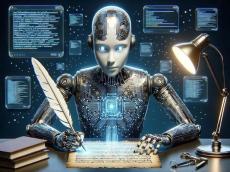|
|
TODAY.AZ / World news
Experts studied impact of artificial intelligence on workplaces
31 October 2024 [23:25] - TODAY.AZ

By Alimat Aliyeva
According to the American think tank Brookings, about 30 percent of all jobs in the United States are at risk of automation, Azernews reports.
Most of the industries currently most affected by generative artificial intelligence (AI) were at least at risk of automation just a few years ago. Generative AI can replace specialized skills and interactive functions that experts previously considered impossible for computers, including programming, forecasting, writing, creativity, communication, promotion, and analysis.
These changes bring both opportunities and risks. On one hand, generative AI can enhance the skills of millions of specialists, making them more productive, creative, informative, efficient, and intelligent. On the other hand, employers may choose to automate some or even all of their managers' jobs, potentially leading to job losses and a decreased demand for previously sought-after skills.
OpenAI data indicates that generative AI could impact more than 30 percent of U.S. jobs and replace half of the professions in these fields. Already, 85 percent of employees feel that this process affects at least 10 percent of their responsibilities.
Unlike earlier automation technologies that primarily affected routine tasks, generative AI is likely to replace many cognitive and non-routine tasks, especially in medium- and high-salary professions. The most affected industries include high-paying sectors such as STEM, finance, and law, as well as office and administrative support roles.
AI may have a moderate impact on education and healthcare. Elementary school teachers and registered nurses can save time with the help of AI, as teachers will spend less time on evaluations, testing, and documentation, while nurses will have more flexibility in diagnosing, maintaining patient records, and adjusting treatments.
However, AI has minimal impact on practical tasks such as medical examinations and laboratory work, which still require personal supervision. Sectors that rely on manual labor are less likely to be affected by AI, and the low-wage service sector will also have less need for generative AI.
URL: http://www.today.az/news/regions/254548.html
 Print version
Print version
Connect with us. Get latest news and updates.
See Also
- 26 January 2026 [15:39]
Washington Post flags risk of ethnic spillover as US weighs Iran intervention - 26 January 2026 [14:26]
India and EU near free trade deal as car import duties set to drop from 110% - 26 January 2026 [13:23]
Blood-streaked US flag: Iran’s mural warns Trump amid warship deployment - 26 January 2026 [12:34]
Earthquake strikes Gansu province as China’s seismic risk remains high - 26 January 2026 [11:52]
30,000 deaths claimed in Iran protests as officials report mass casualties - 26 January 2026 [11:39]
India’s Nipah outbreak triggers policy response in Taiwan - 26 January 2026 [10:23]
Azerbaijan and Bahrain seek to deepen parliamentary and political ties - 26 January 2026 [10:00]
China’s Population Declines for Fourth Consecutive Year - 26 January 2026 [09:00]
Aston Villa agree deal to sign Tammy Abraham - 26 January 2026 [09:00]
Aston Villa agree deal to sign Tammy Abraham
Most Popular
 Moldova’s unification debate, stripped of romance
Moldova’s unification debate, stripped of romance
 Pentagon’s new strategy: Russia a “manageable threat,” China a growing challenge
Pentagon’s new strategy: Russia a “manageable threat,” China a growing challenge
 Trump names 'secret weapon' used in Venezuela
Trump names 'secret weapon' used in Venezuela
 Exhibition 'Inspired by Czechia' opens in Baku
Exhibition 'Inspired by Czechia' opens in Baku
 Chinese automaker takes over Nissan’s South African plant, safeguarding jobs
Chinese automaker takes over Nissan’s South African plant, safeguarding jobs
 Nipah virus outbreak in India: What we know about West Bengal cases
Nipah virus outbreak in India: What we know about West Bengal cases
 Trump names 'secret weapon' used in Venezuela
Trump names 'secret weapon' used in Venezuela
